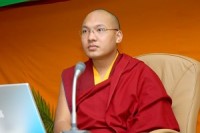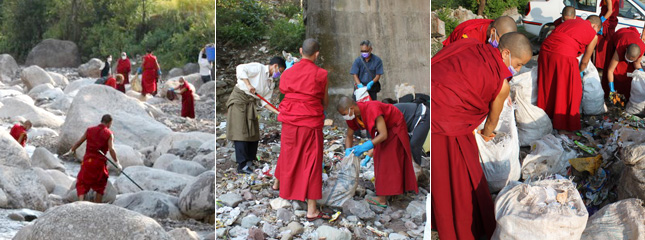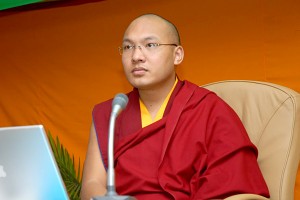法王新闻 | 2009年10月
召開第二屆噶舉傳承環保會議【第五天日誌】
Second Environmental Protection Conference for Kagyu Monasteries and Centers, Day 5-Questions, Discussion and Testing
地點:印度 上密院 Dharamsala
時間:2009年10月07日 October 7, 2009
報導:Tashi Paljor
攝影:Tashi Paljor

問題與討論
Question and Answer Session
Dekil Chungyalpa回答了週二關於野生動物保護的會議上所提出的問題。
Dekil Chungyalpa answered questions arising from Tuesday’s sessions on wildlife protection.
問答要點歸納如下:
Some key points that emerged:
對於環境議題,寺院社區有引導和提供建議的責任。
The monastic community has a responsibility to lead and give advice on environmental issues.
保護環境就是保護野生動物——這兩者是不可分離的活動。
Protecting the environment also protects wildlife – they are not separate activities.
僧眾和尼眾想知道更多他們自己如何保護野生動物。天津諾桑(Tenzin Norsang)建議了三項必需之事:認識、接受、與行動。僧眾和尼眾已經具備了認識與接受。行動則需要策略和計畫、考量可用的預算或特殊的情況。例如2010年是中國的虎年,因此特別將保護老虎作為當年的活動目標可能是合宜的。目標應定為從小處做起,並向外拓展影響。考慮當地與社區的情況,寺院與佛學中心可以組織推廣活動、研討會、與講座。向社區居民詳細解釋環境與野生動物保護的好處,例如發展生態旅遊,是非常重要的。通過與家人,朋友、以及社區其他的人討論環保議題,個人也能發揮積極的影響。拯救老虎與拯救藏羚的活動可以兩相結合;在中印邊界,常有來自印度的老虎肢節和來自西藏的藏羚的交易活動。
The monks and nuns wanted to know more about how they themselves could protect wildlife.
Tenzin Norsang suggested 3 things were necessary: Awareness, Acceptance and Action. The monks and nuns had already developed awareness and acceptance. Action required a strategy and planning, taking the available budget into account, or special circumstances, for example 2010 will be the Chinese Year of the Tiger, so it might be appropriate to specifically target that year for tiger protection activities. The aim should be to start small and expand influence outwards. Having considered the local situation and community, monasteries and centres could organise campaigns, workshops and seminars. It was important to explain the benefits to the community at large of environmental and wildlife protection such as the growth of eco-tourism. Each individual could also have an impact by discussing the issue with family and friends and others within their community .Work to save the tiger could be combined with work to save the chiru; often there was an exchange of tiger parts from India and chiru skins from Tibet at the border.
小組討論
Discussion Groups
此次培訓很重要的一個環節是小組討論,所有的與會代表都有機會討論,並鼓勵資訊和意見的交流。今天上午的討論主題為未來的組織建立。
An important part of the training has been group discussion which offers all the representatives the opportunity to speak and encourages exchange of information and ideas This morning’s discussion was focused on the future organisational set up.
法王噶瑪巴出席了全體會議,並認真聽取了各小組的回饋意見。
The Gyalwang Karmapa attended the plenary session and listened carefully to the feedback from each group.
測試時間
Testing Time
在下午,Dekil Chungyalpa對毫無戒備的僧眾和尼眾進行了測試,測試了前四天會議中的主題,例如「光從太陽到達地球需要多久時間?」等問題。儘管測驗的氣氛很輕鬆,也有些精彩的回答,在證明近日來充分的學習與討論的同時,更是有滿堂的笑聲!
In the afternoon Dekil Chungyalpa sprang a test on the unsuspecting monks and nuns. They were quizzed on topics covered over the first four days, with questions such as, “How long does it take light from the sun to reach the earth?” Although the test was light-hearted, there were some excellent answers, demonstrating how much learning and discussion had been going on, and, there was a lot of laughter!.
現場參觀實習之三——清理河川
Field Trip 3 ─River Clean-Up
理論測試之後,是環保實踐。與會代表轉移陣地,來到當地的河岸,分為不同小組,收集大部份為塑膠與紙質等污染河流的垃圾。
After the theory test came environmental protection in action. The conference members decamped to the banks of the local river where they broke into small groups to tackle collecting the rubbish- mainly plastic and paper – which was polluting it.

